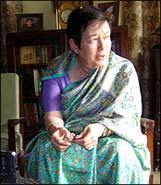At 63, Anita Pfaff, the daughter of Netaji Subhas Chandra Bose, is grace and dignity personified.
Pfaff, a professor of economics at Germany's Augsburg University, is a mother of three -- two sons and one daughter. Her German husband Martin Pfaff is also an academic.
Her ongoing India visit - which comes after a four-year gap -- followed the submission of the report of the Justice M K Mukherjee Commission which was probing for nearly six years Netaji's mysterious disappearance in the air crash at Taihoku, on August 17, 1945. It is believed Netaji died in the crash.
In the second part of an interview with Sujoy Dhar, the daughter of India's Independence hero speaks softly about what role her father could have played in post Independence India.
Don't miss Part 1 of the Anita Pfaff interview: 'I don't think Netaji survived the air crash'
What difference do you think would Netaji have made if he had been present after Indian Independence?
You can speculate what role he would have played if he were around but he definitely would have played an important role. He could have been a rival to the prime ministership, which is quite conceivable.There is no point in believing that he could have worked miracles and everything would have been better. Many problems in India would have remained whether or not he was there. I guess he could have taken a strong stance against corruption.
But one thing I certainly believe is that if Netaji were present in the post-Independence scene, the Pakistan problem might have been avoided. If he could have got his idea accepted, we certainly would have maintained a better relationship with Pakistan.
He probably would have worked very strongly to prevent the Partition of India in the first place and may be an alliance of Gandhi and Bose could have made a difference. Gandhi was not in favour of Partition but he was left alone by all the people around in 1947. Everybody got very enthusiastic to get India independent and some might have had their own personal issues involved too.
Do you think Hindu-Muslim ties in the post-Independence era would have been better?
Muslims trusted him (Netaji) more than any other Hindu leader. And I think his being a Bengali who lived in a state which was predominantly Muslim would have helped, as his ideas were different. There certainly was more trust and acceptance of Netaji on part of the Muslims than other top leaders of Congress at that time. Most other leaders at that time hailed from places where one religion was dominant.
 Do you think the successive governments in New Delhi had been fair to Netaji in giving him his due recognition?
Do you think the successive governments in New Delhi had been fair to Netaji in giving him his due recognition?
I don't think so. The acid test was the way INA (the Indian National Army, raised by Netaji] was treated. I think the INA was treated in a rather poor and dishonourable fashion in the beginning.
It took till the 1970s to even recognise the INA people as freedom fighters. Some lip service was given to Netaji as a person but you may argue that in many different way that could have been better and more.
Because there were many INA people around and many of them died of hunger. That certainly was not a very honourable way to go about it.
It was not about blaming one individual for this but it was also a definite line of establishing that it was only the Civil Disobedience movement which led to the Indian Independence, which clearly was not true.
We now have documents available for analysis and that very clearly shows that though the INA was not successful in terms of winning the war, it was successful in dislodging the hold of Britain on the British Indian Army.
End search for Subhas Chandra Bose: Supreme Court
What about the Nehru-Netaji personality clash?That is part of politics. You always have clash of personalities with not only the people in Opposition parties but also the leaders in your own party.
In an evolving democracy this is almost an institutionalised clash because this is what democracy is all about.
The idea of a possible competitor I think makes one try harder and do better.
Do you keep track of political developments in India?Not very closely, but some developments of national interest.
How do you find the India of 2005-2006? A positive picture or the one same corruption-ridden society?
I think it has a long way to go but we have realised now that even those countries who have prided themselves of not being corrupt actually have high degrees of corruption. So corruption is a cancer of society. We can try to cut down on corruption.
For example, the eviction of the MPs for taking money to ask questions in Parliament seems to be a step in the right direction. It is a small step, but I think there is some awareness.
I think in India corruption would also be reduced step by step, if not eliminated completely.
Trans World Features




